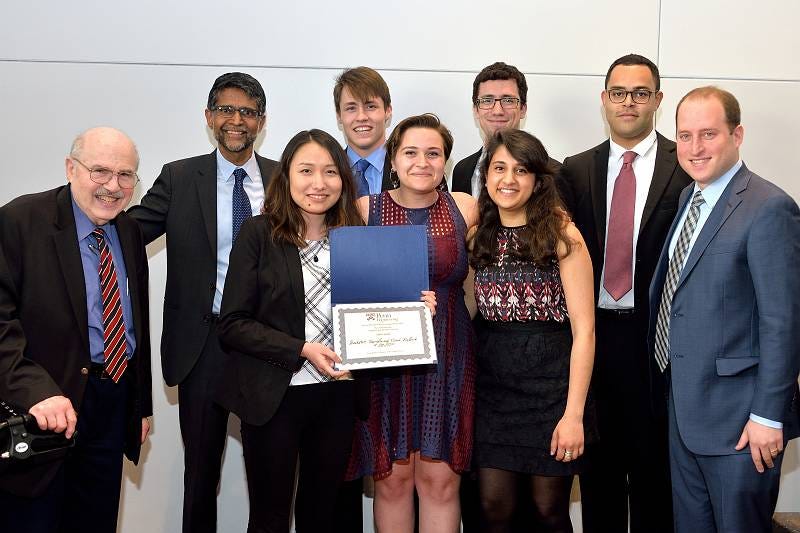Backster, a Posture-Tracking Wearable, wins 2017 Senior Design Competition

Each spring, Penn Engineering’s Senior Design Project Competition pits teams from the school’s six departments against one another. Tasked with finding a real-world problem and solving it with a new piece of technology, the teams spend several months brainstorming different approaches, refining techniques, and consulting with a faculty advisor and outside experts who have experience in the field of their application.
Projects originate in two required courses taken in the fall and the spring semesters of the senior year. Students form teams and work with faculty advisors to come up with devices, apps, and diagnostics that are then presented at departmental and, if they advance, the school-wide finals.
On April 28, contenders assembled in the Wu and Chen Auditorium in Levine Hall and made their pitches to a panel of alumni judges, who graded them on their design process, the results they achieved, and how well they presented the impact of their technology.

This year’s first place project was Backster, a shirt imbued with orientation sensors that can provide real-time feedback on the wearer’s posture. Such a device could find uses in personal training, correcting athletes’ form as they exercise, or in physical therapy, providing data on a patient’s range of motion. The team, hailing from the Department of Mechanical Engineering and Applied Mechanics (MEAM) is comprised of Elyse Chase, Kevin Crossley, Sterling Graham, Nancy Linxuan Fang, Marshall Pritt, and Alysha Singh, and is advised by Senior Lecturer Bruce Kothmann.
In second place was ShadowDrone. The Computer and Information Science team of David Freifelder and Kunal Malhotra, was advised by Ruth Yalom Stone Professor Kostas Daniilidis. ShadowDrone aims to allow users to command a semi-autonomous flying robot through hand gestures. The system allows for simple instructions, such as taking off, landing, simple directional input, and a return function.

Third place went to Frio, another wearable from a MEAM team. This wristwatch-like device uses evaporative cooling to dissipate hear from the user’s body. Team Frio is comprised of Ashley Berg, Nick Demes, Sam Gaardsmoe, Dan Harris, Drew Lilley, and Rachel Schwimmer, and is advised by Class of 1965 Term Assistant Professor Igor Bargatin.
